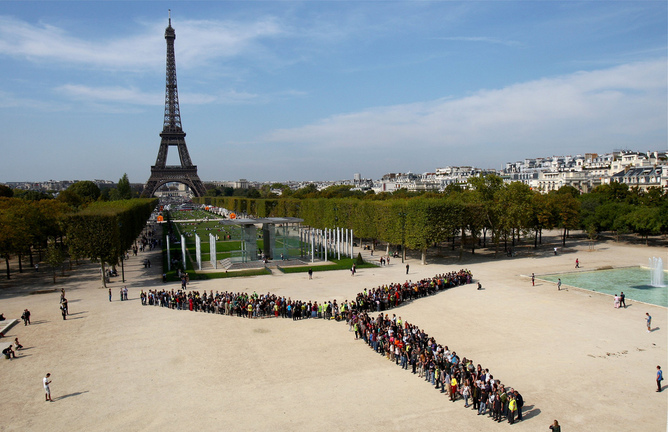
Our climate system is collapsing, but international negotiations in Paris still hold out the best promise for change. Image: 350.org/Flickr
By Ian McGregor, University of Technology, Sydney
Chair of the Intergovernmental Panel on Climate Change (IPCC), Rajendra Pachauri, said last week that on climate, “We have five minutes before midnight”. He argues that governments have historically avoided taking responsibility for global warming. In the more than 20 years since the UN Framework Convention on Climate Change (UNFCCC) was negotiated, global greenhouse gas emissions have increased by more than 30%. What hope is there for the rapid reduction of global emissions that is needed to have a high probability of limiting warming to well below 2C above pre-industrial levels?
This warming represents a level that most climate scientists accept as significantly less likely to result in dangerous climate change. The IPCC Fifth Assessment Report that has just been released confirms we are on a dangerous path. So what are the prospects for the urgently needed rapid change of direction?
Climate change is a global problem that needs a global agreement. Virtually every country on the planet has signed and ratified the UN Framework Convention which seeks to avoid dangerous climate change. The latest stage in these international climate change negotiations was launched in Durban in 2011 and is due to conclude in Paris at the end of 2015.
Is the 2015 Paris Climate Summit likely to be more successful than the failed Copenhagen Climate Summit of 2009?
The short answer is yes. The world has learnt some lessons from the failure of Copenhagen. But it is far from clear whether the outcome from Paris will be strong enough to prevent, with a reasonable degree of certainty, dangerous climate change.
An effective global climate change agreement in Paris will need to address the equity issue, ensuring each country contributes on an equitable basis to both reducing emissions and providing finance. These responsibilities will need to be based on the country’s respective capacity and historic responsibility for emissions.
Countries will have to make specific commitments during 2014 so that these can be assessed and further negotiated well in advance of the final Paris meeting. This was missing in lead up to Copenhagen. The Secretary General of the United Nations, Ban Ki-moon, has called a Summit of World Leaders for September 2014 – and challenged them to bring bold pledges.
The Paris agreement also needs to provide a dynamic framework that recognises that these commitments are not static and that countries need to increase their commitment levels as they develop.
Australia has an emissions reduction target of 5% by 2020 (with a 15-25% conditional target), which both major political parties have committed to. For Paris to succeed, we will need to do much better than that.
Australia’s per capita emission levels are more than double European Union levels and the EU has already committed to a 20% reduction by 2020 with a conditional commitment to raise this to 30%.
And developed countries, like Australia, need to show it is possible to reduce emissions whilst continuing economic growth. In the last year Australia proved this with the carbon price and policies to support renewable energy resulting in a 7% reduction in electricity emissions, whilst employment and wealth continued to increase.
It will be a blow to Australia’s influence in the international negotiations if it continues its current approach of resiling from effective climate action. If the Coalition were to commit immediately to the 15% target, and negotiate with a broad range of stakeholders on effective policies to reach this goal, and future higher ones, this would be a positive step towards an international agreement. It would also increase Australia’s influence on the world stage.
This latest round of climate negotiations was launched from the EU working closely with AOSIS (Association of Small Island States) and the Least Developed Countries (LDCs) at the 2011 Durban meeting. This progressive alliance needs to be nurtured and reinforced by the EU in order to achieve success in Paris.
The US and China are the two largest emitting nations and are therefore critical to a successful outcome in Paris. There have been positive developments in 2013 as they have had bi-lateral talks focused on climate change, with positive outcomes for HFCs – greenhouse gases that are covered by the Montreal Protocol on ozone depletion.
It is, however, too early to tell whether this will have a positive effect on the overall climate negotiations.
The climate science as reiterated in the most recent IPCC report is clear: we are overheating the planet. The scale of global political change required to stabilise the climate is extremely challenging and needs to be a focus of all governments across the world in order to achieve a fair and effective climate agreement in Paris in 2015.
Read more coverage of the IPCC report here.
Dr Ian McGregor receives funding for his research from the University of Technology, Sydney (UTS). He is a member of the Cosmopolitan Civil Societies Research Centre where he undertakes research on on global climate change politics. He organised a recent research seminar at the Centre where Julie-Anne Richards, formerly Global Policy Coordinator of Climate Action Network (CAN) International presented on the global climate change policy process and parts of her presentation have helped to inform this article. Julie-Anne is currently studying for a Master’s degree at the University of Sydney.
![]()
This article was originally published at The Conversation.
Read the original article.
